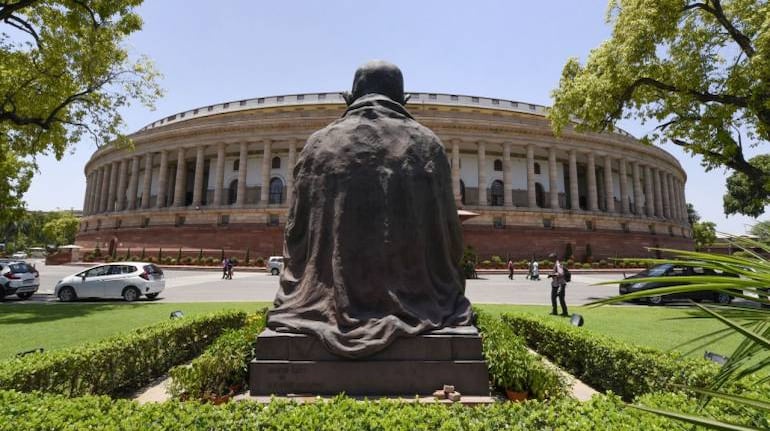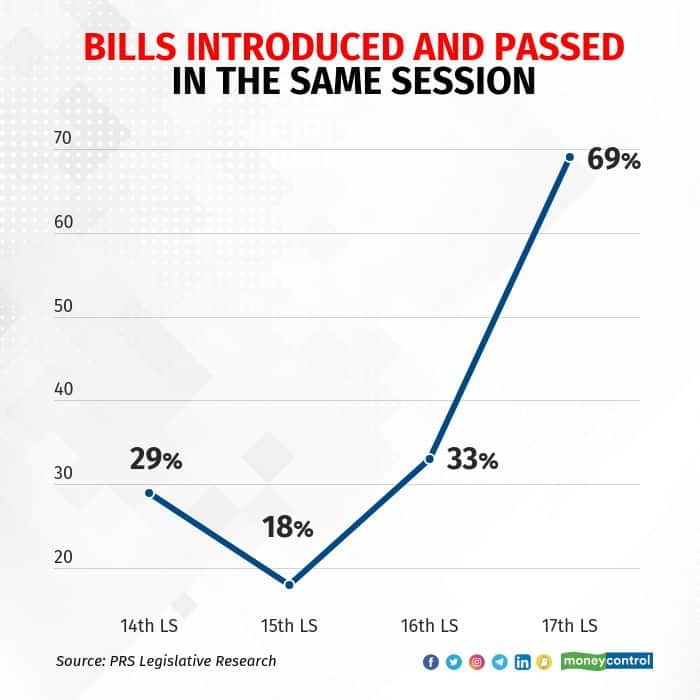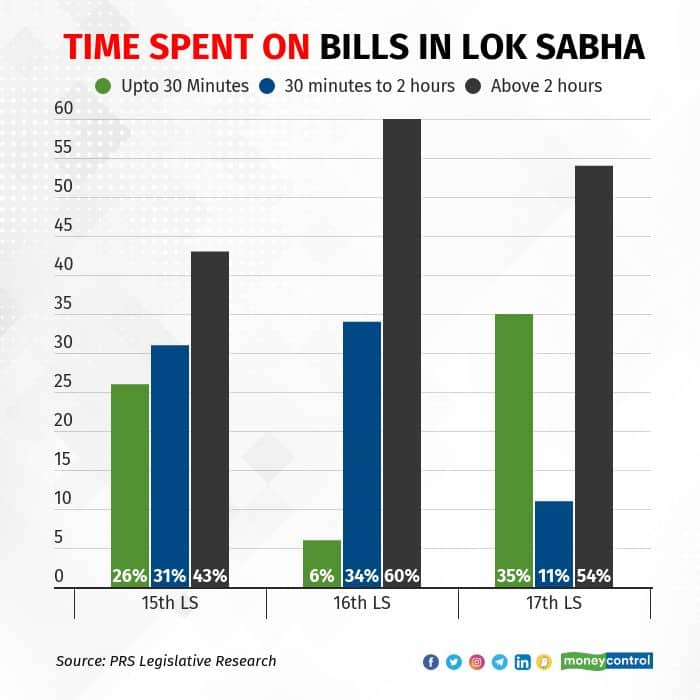



During a recent event at the Legislative Assembly of Rajasthan, the Chief Justice of India (CJI), NV Ramana, highlighted the issue of the declining scrutiny of laws being passed in the country.
“Unfortunately, the space for opposition is diminishing. We are witnessing laws being passed without detailed deliberation and scrutiny,” the CJI said at the event.
It has largely been accepted that safeguarding the parliamentary process is essential for the survival of a democracy. An analysis of the functioning of Parliament in recent years shows that it is on a decline when it comes to holding the executive accountable.
From 1952 to 1970, the Parliament, on an average, used to meet around 121 days a year. Since 2000, this has come down to just around 68 days a year.

PP Chaudhary, former Minister of State for Law and Justice and Lok Sabha MP from the BJP, said that the disruptions caused by the opposition is the reason for the reduced number of sittings.
“If the opposition goes on disrupting the House instead of actually debating the issues, then we can’t maintain the quality of discussions,” he said.
Increasing usage of ordinances
In a parliamentary democracy, the power to make laws lies with Parliament and not the executive. But the government has been increasingly bypassing this basic principle through ordinances.
“Ordinances can be only issued when the Parliament is not in session. So, the decline in the number of sittings over the years, for which the government itself is the reason, is used as an excuse to bring in ordinances saying that there are important regulations that need to be immediately brought out. Essentially, bypassing debate and deliberations over them,” said Maansi Verma, a public policy researcher and the founder of Maadhyam, a civic engagement initiative.
The average number of ordinances promulgated annually went from around 6 in both the 14th and 15th Lok Sabha sessions (2004-2009 and 2009-2014) to 10 and 13 in the 16th and 17th sessions (2014-2019 and 2019 till date), respectively.

The three contentious central farm laws that were repealed were originally brought in as ordinances. "There was no need to bring out those bills as ordinances. Bringing such bills with wide-ranging impacts as ordinances goes against the ideals of a parliamentary democracy," said Elamaram Kareem, Rajya Sabha MP and a leader of the Communist Party of India (Marxist).
Meanwhile, BJP leader and Rajya Sabha MP Sushil Kumar Modi said that farm bills were brought in as ordinances because of the pandemic.
"Ordinances are not unconstitutional or illegal and the government has all the right to issue them if required. Moreover, they have to be eventually turned into an Act in the Parliament to carry any weight," he said.
Although the law stipulates that an ordinance is only valid for six weeks, once a Parliament session begins. This is often circumvented through re-promulgation of lapsed ordinances.
A seven-judge Constitutional Bench had, in 2017, declared that the re-promulgation of ordinances is a ‘fraud on the constitution’. But even this judgment failed to stop the practice.
The Commission on Air Quality Management ordinance, which was issued in October 2020, was re-promulgated in April 2021. The Bill, replacing the ordinance, was passed in both the Houses in August last year by a voice vote amidst din as Opposition members were holding protests related to the Pegasus scandal and the farm laws.
Lesser time spent on scrutiny
Even when Bills are introduced in Parliament, less time is being spent on their scrutiny. Only about 18 percent of the Bills introduced in Parliament were passed in the same session during the 15th Lok Sabha. But this has increased to 33 percent and 69 percent, respectively, during the 16th and 17th Lok Sabha sessions.

The Farm Laws Repeal Bill, 2021, which repealed the three contentious farm laws, was passed in the 2021 Winter Session in both the Houses — without any discussion — in less than 10 minutes. The Lok Sabha only took three hours to pass the Election Laws (Amendment) Bill, 2021, in the same session. In fact, according to data from the PRS Legislative Research, the 17th Lok Sabha has seen the Lower House passing 35 percent of the Bills within 30 minutes.
"It is not true that enough scrutiny is not being done on the bills passed. For instance, the family courts and anti-doping has each been given four hours in this session," said Modi. "In many occasions the debate takes place but due to commotion in the house, they end up getting passed amidst din."

The opposition allege that the government is using its numbers in the Parliament to push through bills.
“The government is just using its large majority in the parliament to steamroll through any bill it wants without listening to anyone else,” said Kareem.
Reduced role of parliamentary committees
Data suggests that there has been a decline when it comes to referring bills to parliamentary committees. None of the Bills introduced in this year’s Budget session was referred to a committee. In fact, only 13 percent of the bills have been referred to committees in the current Lok Sabha. This is much lower than the previous ones. For instance, as much as 71 percent of the bills were referred to committees in the 15th session of the Lok Sabha.
“The importance of parliamentary committees has been reduced over the years. Some of the standing committees are headed by Opposition leaders and the government is not prepared to listen to their inputs,” said Valerian Rodrigues, political scientist and former professor of political science at the Centre for Political Studies at the Jawaharlal Nehru University.

Parliamentary committees have been credited over the years for better drafting of legislations. “My experience with Parliamentary Committees have been that there is lesser political hostilities within these committees compared to the Parliament itself. Discussions happen on the basis of merit there and not just on political lines.” said Kareem.
The reduced role of the committees could also means lesser participation of the people in the drafting of the Bills, as they regularly invite comments from the public on matters referred to them.
Chaudhary disagrees with the notion that the importance of Parliamentary Committees have been reduced. “Bills are sent to Committees based on their nature. The number of bills sent is not important because not all bills need to be sent,” he said.
Discover the latest Business News, Sensex, and Nifty updates. Obtain Personal Finance insights, tax queries, and expert opinions on Moneycontrol or download the Moneycontrol App to stay updated!
Find the best of Al News in one place, specially curated for you every weekend.
Stay on top of the latest tech trends and biggest startup news.